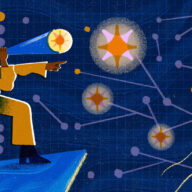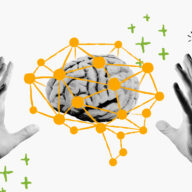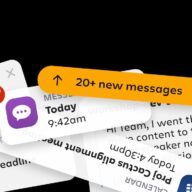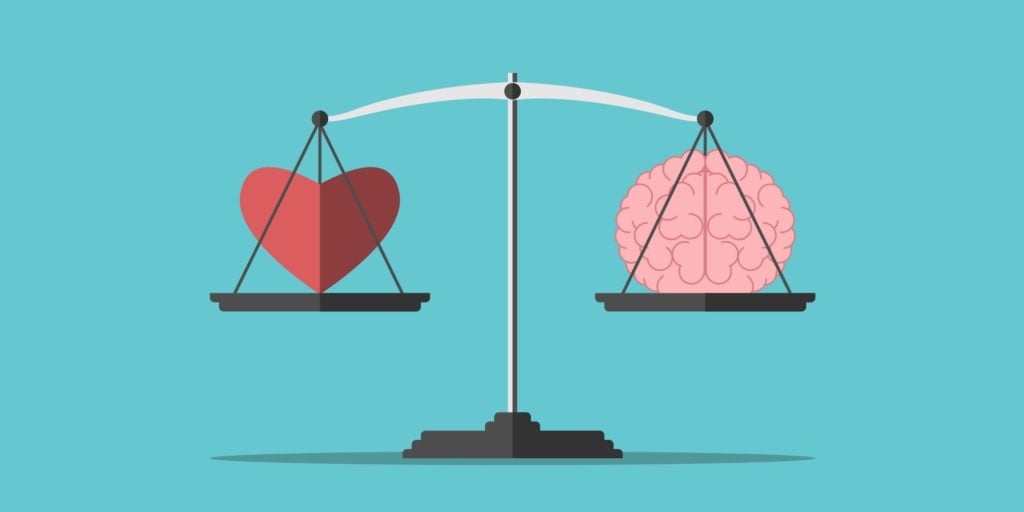What does it take to build a dream team that will skyrocket a company and its members to success? Experts are looking to one strategy in particular for taking team productivity from good to great: Emotional intelligence, or EQ, a skill that is an increasingly important part of individual and now, group professional development.
What Is Emotional Intelligence?
At a basic level, emotional intelligence is a person’s ability to identify and manage their emotions appropriately.
EQ has been making inroads into the workplace since the 1990s, but the focus on group development has lagged behind its development as an individual competency. As the professional ecosystem becomes increasingly connected, however, and complex systems require a group effort instead of individual support, group dynamics of culture, emotion and behavior are proving to be the key to engagement, longevity, and success.
In fact, professional EQ is now arguably as important as technical skill (IQ) for success in the workplace. In other words, the adage “It’s not personal, it’s just business,” no longer applies because studies show that true engagement and innovation stem from a personal investment in the task at hand.
The Profile Of An Emotionally Intelligent Team
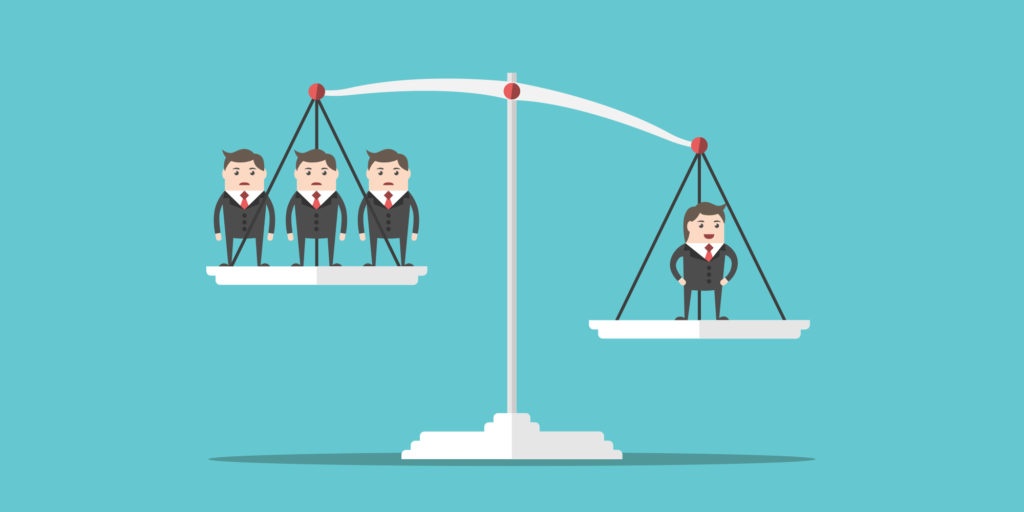
There are three key team attributes that indicate healthy interpersonal EQ in a team, according to this detailed analysis from EQ experts Dr. Vanessa Druskat and Dr. Steven Wolff:
“Our research tells us that three conditions are essential to a group’s effectiveness: trust among members, a sense of group identity, and a sense of group efficacy.”
Can your team function without these conditions? Yes. Will you be reaching your ultimate potential and realizing your work as efficiently as possible? Likely not. The lack of “dream team” status isn’t because of a technical skill gap or inexperience. It’s because your team members don’t feel comfortable enough to fully engage emotionally with each other, and therefore, the task at hand.
Don’t run over and confront/hug it out your workmates just yet—this lack of engagement is likely a subconscious reflex to the fact that you haven’t all been chums since birth. It’s also because many teams don’t actively work on and develop these three pillars of productive teams in a consistent way.
Since you’re probably thinking this dream team idea sounds pretty good, here’s the plan: Focus on the following nine areas of team emotional intelligence, and you’ll start to realize the power of EQ for your organization.
How To Normalize Group EQ

Your key to team EQ lies with the Group Emotional Competence (GEC) Inventory. Based on the work of Dr. Druskat and Dr. Wolff, once you develop this inventory of norms into habits among the members of your team, you will set mutually-accepted patterns of behavior that foster trust, understanding, and support. Doesn’t that sound like a great place to work?
First, randomly gather your workmates into a circle, dim the lights and gently stroke their hair. Just kidding—that’s the opposite of developing social norms. Social norms are unwritten rules that are collectively agreed upon to be the expected mode of conduct in a group setting. As long as everyone in your group likes to show caring behavior through a feeling circle, then the above scenario could be your norm.
According to the GEC Inventory, emotional competence is achieved through nine specific norms, which form a grid like this:
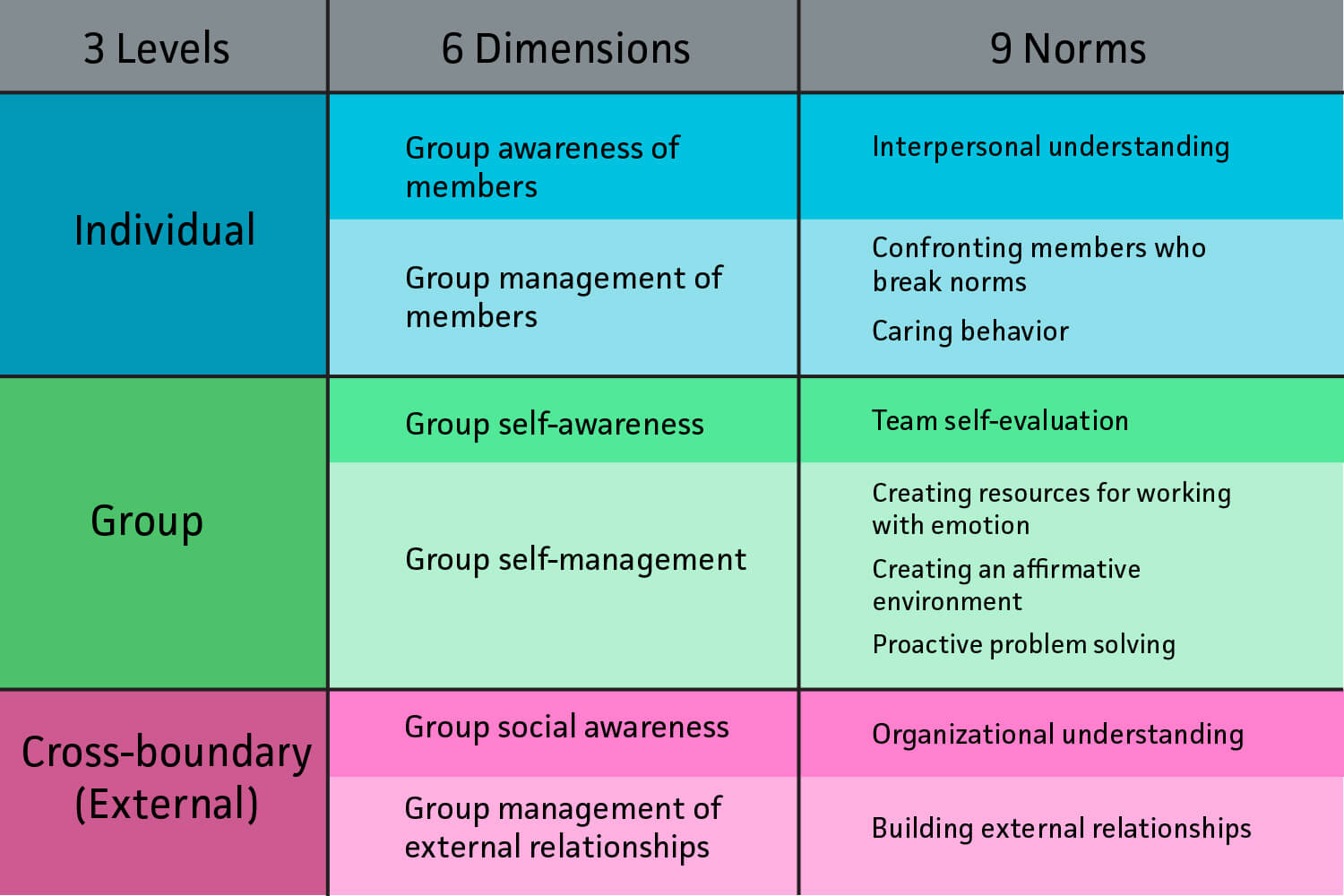
Source: http://www.eiconsortium.org/pdf/GEI_Technical_Manual.pdf
These norms develop a team from the individual level (each team member), as a group (all team members together) and at a team-to-team level, such as across departments in your company. The dimensions of this development focus on awareness and management of emotions at each level. The norms are the positive habits your team develops to have a healthy EQ.
Ok, that’s it! Go to it! Again, just kidding—developing a strong team is easier said than done. And, you definitely need to go beyond the annual company picnic and monthly brown bag seminars.
99 Problems But Norms Ain’t One
Here are everyday ways your team can normalize intuitive group emotional intelligence, including some of our group EQ efforts here at Trello:
Interpersonal Understanding
At the most basic level, you’ve got to facilitate group awareness of each team member’s personal level of comfort with group activities and projects. Taking each individual perspective into account when making group decisions may seem obvious, but simply asking: “What does everyone think?” in a group setting isn’t enough.
A team member who identifies as an introvert, for example, may not feel as comfortable speaking up in a public forum. Another may start a discussion looking at the negative side, and then move on to process the full picture. A third might be quick to talk out all the exciting big picture possibilities but struggle with the finer details. A team needs to accept and acknowledge that all of these perspectives are valid and important towards achieving a successful end goal.
EQ Excellence: Perspective is key. Each team member needs to take on the responsibility of, and be transparent about, taking different perspectives into account.
Confront members who break norms

You probably already have a set of “OK, not OK” rules for treating people on your team. For example, at Trello we try to avoid making people feel bad for not already knowing a concept or fact that others might already know. “Who doesn’t know what The Electric Slide is?!” a teammate recently noted via Slack. It turns out, “who” is everyone born outside the US and/or after 1990. Rather than letting this… slide, the team took a moment to call out the norm breaker. It wasn’t intentional, but that doesn’t make it OK. A meaningful apology, followed by forgiving responses was enough to move on and lead into a fruitful discussion of favorite dance moves.
EQ Excellence: You don’t need to feel bad about breaking a norm, but being vigilant to call out and correct the mistake in a non-judgmental way makes team comfort and safety a top priority.
Self-evaluate your team
Take time and perspective to assess your strengths and weaknesses as a team on a regular basis. You can do this officially with evaluation exercises or via a third-party consultant, or you can build internal feedback into weekly team meetings or check-ins. Keep the feedback general to your team as a whole and look at things like major wins, productive processes, annoying setbacks, emotional states and ways you interact with each other.
EQ Excellence: Evaluation is for improving your team. Keep this goal (and norms of interpersonal understanding, caring behavior, and appropriate confrontation) in mind when airing grievances or calling for changed processes.
Create resources to work with emotion
Everyone has emotions, and business can bring out the best and worst of those feelings. Having resources for allowing emotion to factor into work is much healthier for team attitude than pretending that big, frustrated elephant isn’t in the room. For example, we use some time at our Friday team meeting to casually chat about mistakes we made that week. The discussion is geared towards venting general frustrations (read: not personal critiques) and identifying lessons learned. In our world, it’s totally OK to say, “I effed up!”
EQ Excellence: Build out, not up. Bring your team’s emotions out in the open, in a healthy and not-too-serious way.
Create an affirmative environment
Yes, your team loves their work, but they also need a spoonful of sugar to help it all go down as effectively as possible. Put the emphasis on optimism as much as possible. For our marketing team, this translates as “always assume best intentions.” As a team, we have committed to always treating everyone’s words, efforts and actions as good, positive intention for the good of the group. We have found this goes a long way in eliminating mistrust and worry over perception.
EQ Excellence: Having a sunny disposition doesn’t mean you have to sing a musical. It just means that your team operates from a place of positivity as much as possible.
{{cta(‘4e0d7e46-1775-4afd-92f6-7d79e287abf6’)}}
Problem solve proactively
With an emotionally intelligent team, no one should struggle with a problem alone. And no one leaves a problem unattended with the assumption that it is someone else’s stress to deal with. At Trello, this has developed into the creed of don’t do nothing. We are all empowered to take initiative on a problem, in any part of the company, that needs attention. Because of this we are not left isolated to deal with stress in our areas of expertise alone.
EQ Excellence: Many hands make light work. Proactive problem-solving as a team means that no one is an island, and no one does nothing when something needs to be addressed.
Behave with care

This is a basic, grade school lesson that we probably all need to work on from time to time: Treat others as you’d like to be treated. This includes compassion for personal struggles, validation of each other’s value and support for the effort each of you is putting into your shared goals.
EQ Excellence: Have each other’s back, y’all! Say please and thank you, take the time to have a vested interest in each other’s state of being. You don’t have to be best friends, but you have to be great teammates.
Understand your organization (for real)
Your team might be totally in sync, but how does your tight team fit within the larger group? Close teams can be clique-y, and a hyper-inward focus can leave other groups within the company out of the loop.
This might be a marketing team who launches a major campaign without considering the influx of support tickets during an already-busy renewal season. It could be a dev team that ignores an administrative feature request because it doesn’t seem as important to them as a new software update.
Consider taking rotating turns acting as liaisons with other departments, or field external feedback on major initiatives that impact the company as a whole. Enjoy the goodwill you receive in return!
EQ Excellence: Don’t be that group in the lunchroom. Keep your team open to the perspectives and experiences of other teams and individuals in your company.
Build external relationships
This EQ norm takes action on your team’s organizational understanding. Some of our developers recently started a Trello “Coffee Talks” series where they break down technical concepts for non-technical team members in an informative way.
At our monthly Town Hall meetings, different teams present their latest projects in an open forum style that invites external employees to get involved or offer ideas. We also have a weekly informal Mr. Rogers meetup series that lets people chat cross-team, just for fun. We are always aiming to offer new and interesting inroads for people to connect and build relationships.
EQ Excellence: Be ambassadors of your field. Aim to empower others with your team’s expertise, and invite curiosity with active outreach.
EQ development is an on-going commitment to the wellbeing and productivity of your team, but it doesn’t have to be complicated. Trust, understanding and support are built by the little, everyday things that make a group of people into a team. Group hug!











